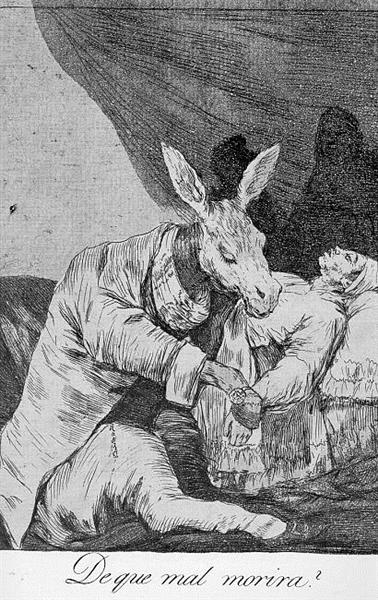Description
The work "What will die? - 1799" by Francisco de Goya, highlights as a clear example of the deep introspection and critical thinking that characterize the artist throughout his career. In this painting, Goya captures a moment of existential contemplation through the representation of a man who seems to be in a state of intense reflection. This approach to life and death, recurring issues in his work, translates into a gloomy and deep vision that invites the viewer to question the inevitability of human destiny.
The composition of the work is remarkable for its simplicity and, at the same time, for its emotional depth. The man, represented in profile, is contemplating the landscape that extends before him, a natural space seems to be the metaphor of the unknown. This use of empty space creates a sense of isolation and vulnerability, reinforcing the existential load of the moment. Goya uses with skill the contrast between the human figure and the environment, guiding the viewer's attention towards the face of man, which reflects a mixture of concern and curiosity, a symbol of the human condition.
The color in this work is subtle and nuanced, predominantly dark tones that evoke an introspective and melancholic atmosphere. The palette, in general, consists of shadows and dim lights that play a fundamental role in the creation of an environment loaded with emotional tension. Goya, known for its ability to use the color as a vehicle of emotions, makes the work not only represent a moment, but also communicate a state of the soul, an echo of the concerns of its time.
Although "what will die?" It reflects Goya's philosophical interests, it can also be seen as an answer to the concerns of the period in which it was created, marked by political and social seizures. Goya, who witnessed drastic changes in Spanish society, uses his art as a means to explore and question existence. This painting, although less famous than others in its "whims" series, reveals its commitment to the critical analysis of morality and human life.
In the broadest context of his work, this piece is aligned with other paintings of the end of the 18th century and early nineteenth century, where Goya explores the duality between the sublime and the grotesque. However, "what will die?" It is distinguished by its almost minimalist approach compared to works of greater narrative complexity. The absence of multiple figures or ornamental details allows the central message to resonate more clearly.
Throughout his career, Goya continued to explore issues of the human condition through his stylistic evolution, from Rococó to Romanticism, demonstrating a versatility that would enshrine it as one of the precursors of contemporary art. "What will die?" It is like a testimony of its ability to amalgamate personal and universal concerns in one painting, Offering the viewer not only a visual delight, but an invitation to reflect on the great issues of human existence. In this sense, the work becomes a mirror that reflects both the shadows of humanity itself and the flashes of the tireless search for meaning in an uncertain world.
KUADROS ©, a famous paint on your wall.
Hand-made oil painting reproductions, with the quality of professional artists and the distinctive seal of KUADROS ©.
Reproduction service paintings With a guarantee of satisfaction. If you are not completely satisfied with the replica of your painting, we refund your money 100%.

